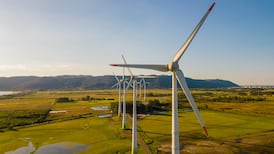To invest wisely, you shouldn’t have to choose between growth and ethics.
It’s why so many people are seeking out pensions providers that invest in entities that are environmentally and socially sustainable, and which operate to best-practice standards of governance. At Zurich Life, it’s not enough.
“We start a step higher up,” says Ian Slattery, investment consultant at Zurich Life. “We put ‘responsible investment’ as the overarching input into our investment policy.”
In 2012 Zurich was an early adopter of the UN’s Principles of Responsible Investment (PRI), developed to reflect the increasing relevance of environmental, social and governance (ESG) issues to investment practices.
“Responsible investment has a number of strands to it, with ESG being just one part,” explains Slattery.
“Our guidance on this is the UN’s PRI, whilst our own philosophy is about ‘doing well and doing good’. We are very conscious that our primary goal is to help people to save for retirement and have a good pension at the end of it. But we believe you should be able to do both.”
Perhaps surprisingly, responsible investment at Zurich is not about automatically excluding investments in certain sectors, although it will not invest in firms that make cluster munitions or companies that rely heavily on thermal coal. Other than that, when it comes to equity investments, opportunities are looked at on a case by case basis. For example, avoiding investment in all fossil fuel companies ignores the fact that some of them are actually the world’s leading developers of green energy alternatives too, he points out.
Getting active on your behalf
“In the past, such investments worked on the basis of being exclusionary, now the market is much more inclusionary, and is much more about active investment,” he explains.
We invest in a range of companies, we engage, we vote, we take a viewpoint. We try and change from within
Zurich’s Prisma Funds, for example, are actively managed funds which aim to achieve growth through capital gains and income from investing across a diversified range of global asset classes, including equities, bonds, property, commodities, cash and alternative investments.
Doing so gives Zurich an influence it simply couldn’t have if it operated on an exclusionary investment basis, he points out. “We invest in a range of companies, we engage, we vote, we take a viewpoint. We try and change from within.”
When assessing any investment, it looks at valuation and growth prospects as well as indicators relating to ESG.
“We use MSCI (Morgan Stanley Capital International) data so that all our corporate bond and equity investments have an ESG overlay, it’s an input into the overall decision making process,” he says.
Recent years have seen a significant shift in the Zurich Group, as a result of the UN’s PRI guidelines.
“Being an active investor means you’re not just buying the market. In such cases you don’t have the ability to influence management. This way we have the ability to engage with management and vote. That is what allows us to effect change from within.”
Climate change is a huge issue right now, and rightly so, he says. But it’s not the only consideration. “The environment piece of ESG gets a lot of airtime but social and governance, the S and G, are massively important too. Social deals with how you engage with your principle stakeholders such as your employees and your local community. Governance for example means having good audit procedures and having an independent board.”
Doing well and doing good
Seeking these out is simply good, prudent management for any investor, avoiding companies with worrying signs of fraud, for example. Zurich’s investment managers undertake extensive analysis and have access to the analysis of others. “It’s not just blindly buying something, it’s about making active decisions,” he explains.
“ESG is part of the decision-making mix, alongside growth prospects and valuation price. It’s integrated in to our selection process and goes back to the aim of doing well and doing good.”
The importance of ESG means more to some individuals than it does to others, he accepts. “Everybody is different but we see that a lot of this will be increasingly regulatory-driven by EU legislation.”

Those looking to start a pension can find out more about Zurich’s approach at its Responsible Investment Hub. That will help when you come to have that conversation with your financial advisor, he recommends.
After all, your appetite for ESG is one of a number of factors that will determine your pension choices, alongside things like your age profile, retirement income goals, and appetite for risk.
“Risk means something different to everybody and ESG does too,” he says.
“For some it will be the blunt approach of mass exclusions. We take an approach that’s a lot more subtle. It goes back to the fact that the biggest spenders on clean energy are also the biggest offenders in fossil fuel, so it’s not a black or white, binary decision. That’s why it’s so important to have these conversations with your financial advisor.”
For Zurich, responsible investment is all about 'doing well and doing good'. Find out more about Zurich's commitment and practices in relation to responsible investment.
Taking a small action today and speaking to us or a financial broker could have a great impact on your future. With a wide range of options, control and flexibility, you can choose a pension plan that's right for you. If you're wondering where to start, you can find a local financial advisor near you with the Zurich Advisor Finder.
This article is intended to provide general guidance only. If you have not done so already, we suggest that you consider taking independent professional advice from your financial adviser and/or your tax adviser based on your own particular circumstances.
Zurich Life Assurance plc is regulated by the Central Bank of Ireland.









